
128.7K
Downloads
86
Episodes
Theological Bible Video Podcast with PhD Professors, Experts and Professionals on Life, Faith, Culture and History from a Christian Perspective.
Theological Bible Video Podcast with PhD Professors, Experts and Professionals on Life, Faith, Culture and History from a Christian Perspective.
Episodes

Wednesday Nov 27, 2019
Aesthetics: A Theology of Beauty (Jo Ann Davidson)
Wednesday Nov 27, 2019
Wednesday Nov 27, 2019
This week on Advent Next’s Theological podcast, we are discussing the aesthetic nature of God with Dr. Jo Ann Davidson, Professor of Systematic Theology at Andrews University. Our topic today is inspired by her book “Toward A Theology of Beauty.”
“The uniqueness about the Bible is that everything God touched was beautiful.” We begin our journey of exploration in the Garden of Eden where God expresses His artistic tastes in the formation of man and animals. He is not only tasteful in his design, but shows care in His craftsmanship. In the formation of both Adam and Eve, “God created love, and romance, handsomeness, and beauty.”
The next artistic feat that God spends a substantial amount of time discussing in the Bible is the architectural design of the sanctuary. “There are more chapters about the sanctuary in the Pentateuch than any other topic.” The first person God imbued with the Holy Spirit is Bezalel, which is a wonderful revelation that God considers the artist just as much a minister as a teacher, evangelist or prophet. “Bezalel is the first person in the Bible, who is said to be filled with the Holy Spirit. Being an artist is a type of ministry.” “An artist can best express the beauty of truth and make it have the highest value.”
By understanding the way that God speaks, we see that He is more than just a systematic theologian. “The Bible is not a systematic theology. It is a system of truth. But God, when He reveals Himself, takes great pains to reveal His aesthetic nature.”
Facebook: www.Facebook.com/adventnext
Instagram: www.instagram.com/adventnext
Youtube: https://www.youtube.com/channel/UCF6IbZ5pEYtgoWf88hb7vHQ
Spotify: https://open.spotify.com/show/7cdgW0RKIrny6Ru47l61CE
Apple Podcast: https://podcasts.apple.com/us/podcast/advent-next/id1452748484
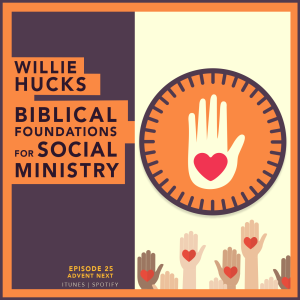
Thursday Nov 21, 2019
Biblical Principles For Social Ministry (Dr. Willie Hucks)
Thursday Nov 21, 2019
Thursday Nov 21, 2019
This week on Advent Next’s theological podcast, we are discussing the Biblical Foundations for Social Ministry with Dr. Willie Hucks, the chair of the church ministry department at Andrews University. “I think too often we allow the political conversation, to drive our theological understandings.”
Many churches can often find themselves divided into party lines when it comes to social issues. Rather than sharing a common ethic and value in Christ, we allow politics to drive the conversation rather than the Bible. How do we navigate these tensions? “Instead of allowing politics to drive the conversation, whether you stand on the right or the left, the real question is, ‘from a biblical perspective how does God see X.’”
Is the “social gospel” or emphasis upon social justice genuinely taking away from the gospel commission? How do we understand Christian ministry from the vantage point of heaven?
“When we speak of the image of God, How do we define image? It’s not just spiritual, it’s mental, it’s moral, its physical. It is the sum of the human. Therefore if we see humanity in a holistic fashion, then we relate to every man, woman, boy, and girl in a holistic way. That enables us to not think on the right politically or on the left politically, but from the perspective of the divine view...and that transcends race, ethnicity, gender.”
In our present Western culture, there is an emphasis on individualism and independence. And yet, the culture from which the Bible was written indeed focused upon salvation from a community perspective. So what is the application of this communal emphasis into our present situation?
“We often fall into twin traps. We see the Bible from an individualistic perspective that the Bible is an individual thing and not a corporate matter. We can also fall into the trap of thinking that you have to preach eternal life without preaching societal relevance. The two are not mutually exclusive .”
Some churches might also fear that an emphasis on social issues takes us away from our historical identity as a church. “Often we forget that the early Adventists were social pioneers.”
Understanding our responsibility to think communally about the gospel rather than individualistic (while not negating the individual aspects of salvation), helps us come to a more practical understanding for how the gospel should be lived out in our everyday lives.
“Our responsibility then is to proclaim from our pulpits and in our daily interactions with those in our community, that we serve a Christ, and we worship a Christ that is interested in the now and not yet, the here and the hereafter.”
“If the gospel is to reach society, we have to reach society where they are.”
Follow us on Instagram, Facebook, Or Youtube @ Advent Next
Facebook: www.Facebook.com/adventnext
Instagram: www.instagram.com/adventnext
Youtube: https://www.youtube.com/channel/UCF6IbZ5pEYtgoWf88hb7vHQ
Spotify: https://open.spotify.com/show/7cdgW0RKIrny6Ru47l61CE
Apple Podcast: https://podcasts.apple.com/us/podcast/advent-next/id1452748484
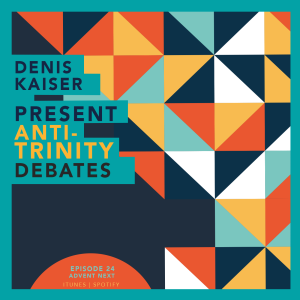
Thursday Nov 14, 2019
Present Anti-Trinitarian Debates (Dr. Denis Kaiser)
Thursday Nov 14, 2019
Thursday Nov 14, 2019
This week on Advent Next, a theological podcast curated for curious faith discussions, we are continuing our conversation with Dr. Denis Kaiser, assistant professor of Church history at Andrews University. We will continue to explore the development of the trinity doctrine, anti-trinitarianism and the present controversies surrounding the role of Jesus in salvation and the nature of His subordination to the Father.
Last week we discussed the history of the trinity from the 4th century on, what is the trinity and anti-trinitarianism exactly, and lastly focusing particularly on the progressive understanding of the nature of Christ within early Adventism.
This week we will discuss the recent debates surrounding the trinity, how the trinity became recently related to the issue of women’s ordination, and how the nature of Christ impacts the work of salvation.
If you’d like to listen to some of our other podcasts related to faith and theology you can find us on Spotify, iTunes or Apple podcast @ Advent Next or follow us on instagram, facebook, or youtube at the handle @ adventnext.
Facebook: www.Facebook.com/adventnext
Instagram: www.instagram.com/adventnext
Youtube: https://www.youtube.com/channel/UCF6IbZ5pEYtgoWf88hb7vHQ
Spotify: https://open.spotify.com/show/7cdgW0RKIrny6Ru47l61CE
Apple Podcast: https://podcasts.apple.com/us/podcast/advent-next/id1452748484
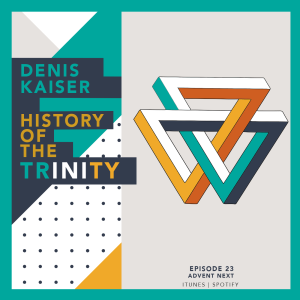
Thursday Nov 07, 2019
Development of the Trinity Doctrine In the Modern Era
Thursday Nov 07, 2019
Thursday Nov 07, 2019
This week on Advent Next theological podcast, we are discussing the development of trinitarian doctrines in the Christian church, particularly the development of the trinity within Adventism. Dr. Denis Kaiser is the assistant professor of the Church History department at Andrews University. Surprisingly, Dr. Kaiser began his journey in the church as a staunch anti-trinitarian.
“I think the difficulty we encounter is we have one term that we use. And it’s the same term that other Christians use. So the term ‘trinity,” which I think in general, just describes the basic concept that there are three divine persons, personalities, and they are one. But the question of course, is, What does it mean that they are one? What does it mean that there are three persons? How do we understand the term ‘person’?”
We begin our journey in the 4th century during the council of Nicea. Dr. Kaiser provides a brief overview of some of the tensions and argumentations presented in the early church that contested our modern understanding of the trinity. The early church wrestled with understanding the dual divine and human nature of Christ, as well as the personhood of the Holy Spirit.
“Tertulian talks about the triad. Now the language is not Biblical, but in the Bible, we seldom have technical language. We just try to capture what we see, the phenomena, and try to find terms to capture that and grasp that.”
Even in the early century, the concept of the trinity was present. Questions about Christ’s relation to the Father (was he co-eternal or did He have a point of origin in the distant past?) became a topic of debate.
Moving forward through history, these same questions regarding the relation of Christ to the Father and the nature of the Holy Spirit were present in the Adventist pioneer history. Early Adventists, according to Dr. Kaiser, were semi-Arian, meaning they believed that Jesus had a point of created origin in the distant past, yet this view evolved. Eventually, these same pioneers left their semi-arian beliefs and came to understand that Christ was indeed co-eternal with the Father.
Dr. Kaiser reflects on his early anti-trinitarian view saying, “I felt closely connected to the Adventist pioneers...Since we believed that God led the Adventist pioneers, we thought, therefore that they must be right in everything. But of course, this is based on a very monolithic static view of Adventist history.”
You don’t want to miss this insightful discussion with Dr. Kaiser on the topic of the trinity and the development of trinitarian theology within the Sabbatarian movement, also known currently as the Seventh-day Adventist church.
Facebook: www.Facebook.com/adventnext
Instagram: www.instagram.com/adventnext
Youtube: https://www.youtube.com/channel/UCF6IbZ5pEYtgoWf88hb7vHQ
Spotify: https://open.spotify.com/show/7cdgW0RKIrny6Ru47l61CE
Apple Podcast: https://podcasts.apple.com/us/podcast/advent-next/id1452748484
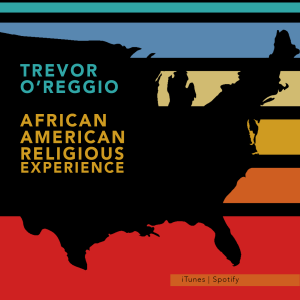
Wednesday Oct 30, 2019
The African American Religious Experience (Dr. Trevor O'Reggio)
Wednesday Oct 30, 2019
Wednesday Oct 30, 2019
“We know from Christianity that a person cannot address issues of reconciliation and forgiveness unless, first of all, they acknowledge that they have committed a wrong.”
Moving forward on race relations in the church is a difficult conversation to navigate, especially within this political climate. What does it mean to be both black and Christian in America? This week on Advent Next, we are continuing our discussion with Dr. Trevor O’Reggio to talk about the history of the African-American Religious experience in America as well as solutions on how to improve race relations in the church.
If you didn’t listen to last week’s episode, check out our discussion with Dr. Trevor O’Reggio on the history of African Christianity and the contributions of African Intellectualism to western theology. Moving forward through history, we’re continuing our discussion with Dr. O’Reggio, on the African American religious experience. We also end our show today with a special guest appearance from Andrew Ashley, the director, and producer of the documentary “the Wound,” in which he investigates the history of race relations in the church as well as what we are doing today to move the conversation forward.
Thanks again to the Adventist Learning Community for making this program possible, and thank you for taking the time to listen in. If you have a question or comment about today’s program, please follow us on Instagram, Facebook or Youtube @ adventnext.
If you’re not already following us on Instagram, Facebook, or Youtube, you can find us at the handle @ adventnext. My co-host today is once again Michelle Odinma, you can follow her @ michelleodinmamusic. And as always, I’m your host Kendra Arsenault, and this is Advent Next.
To listen to the full podcast you can find it on iTunes, Spotify or Apple Podcast @ Advent Next.
Facebook: www.Facebook.com/adventnext
Instagram: www.instagram.com/adventnext
Youtube: https://www.youtube.com/channel/UCF6IbZ5pEYtgoWf88hb7vHQ
Spotify: https://open.spotify.com/show/7cdgW0RKIrny6Ru47l61CE
Apple Podcast: https://podcasts.apple.com/us/podcast/advent-next/id1452748484

Wednesday Oct 23, 2019
021: The Forgotten African History of Christianity (Dr. Trevor O'Reggio)
Wednesday Oct 23, 2019
Wednesday Oct 23, 2019
This week on Advent Next, a theological podcast for curious faith discussions, we are exploring the contributions of non-western African Christianity to the foundations of Christian faith. We will also be discussing the African-American religious experience with Christianity during the span of slavery in the United States. This week’s recommended reading is a book by Thomas Oden entitled “How Africa Shaped the Christian Mind: Rediscovering the African Seedbed of Western Christianity.” Our guest today is Dr. Trevor O’Reggio, chair of the history department at Andrews University and a specialist on Reformation History.
African Intellectual Contributions
“The greatest center of early Christianity was an Afro-Asiatic city, Alexandria. This is where the great early theologians of the church were centered. Athanasius, Alexander, Tertullian, and origin, even Augustine himself, the father of medieval theology, almost all of them are African.”
Some of the greatest intellectual contributors to our modern understanding of Christianity, including the Trinity and the divinity of Christ, came from the African fathers of the faith.
“When we come to the New Testament, we know that the first non-Jewish convert to the early church is African who then takes the religion back into Africa. When we look at the actual development of the early church, we see that this was primarily an African/Asian (modern Turkey) religion.”
The Movement of Christianity from East to West
We not only discuss the dominance of eastern Christianity in the early centuries, we also discuss how Christianity became a religion of the east, to a religion of the west.
“[Christianity] began to move toward the west and the north with the ascension of Constantinople. If you recall when Constantine took over the empire, he moved from the west, and he made Constantinople in Turkey his new capital. Since there were many varieties of Christianity, he tended to give preference to a certain brand of Christianity, which is going to emerge and control what we call Western Christianity.”
With the rise of Constantine and the preference he gave to the bishop of Rome, western Christianity began to ascend to power. However, it wasn’t until around 1000AD that Christianity in the east began to lose power due to the rise of Islam.
“As Christianity was taken over in the west by the bishop of Rome, there was another Christianity in the east and in the south, which was thriving. But with the rise and emergence of Islam, that Christianity, which was very strong in the countries I identified (Morocoo, Tunsia, Algeria, Egypt, Sudan) would eventually be replaced by Islam.”
A Slave's Introduction to Christianity in America
Finally, we explore how Christianity had been shaped by its European baptism, along with how it was used to justify the enslavement of Africans in America. While this was never the Bible’s original intention, the culture in which Christianity had preeminence influenced the way it was interpreted.
“By the time the American Christians came to the Americas, Christianty and Western culture had become one. Western culture had essentially co-opted Christianity. Christianity was now being interpreted primarily by the eyes of Europeans. Essentially it was a Eurocentric religion.”
“A religion that essentially says to you, your place as a slave has been foreordained by the gods of Christianity. This was not a religion that was receptive to African slaves. The religion was reinforcing their status as slave and saying that the god of the Christians was in agreement and condoned the enslavement of Africans in the Americas. The religion became a tool to justify slavery, a tool to try to pacify slaves to make them more obedient and servile to their white masters.”
“The turning point for slaves in the introduction to Christianity took place during the Great Awakening. For the first time black slaves responded in great numbers to the Christian message. Revivals tend to break down barriers. This was the first context in which large groups of whites and blacks met together.”
To listen to the full podcast you can find it on iTunes, Spotify or Apple Podcast @ Advent Next. Be sure to follow us on facebook, Instagram, and Youtube @ adventnext.
Facebook: www.Facebook.com/adventnext
Instagram: www.instagram.com/adventnext
Youtube: https://www.youtube.com/channel/UCF6IbZ5pEYtgoWf88hb7vHQ
Spotify: https://open.spotify.com/show/7cdgW0RKIrny6Ru47l61CE
Apple Podcast: https://podcasts.apple.com/us/podcast/advent-next/id1452748484
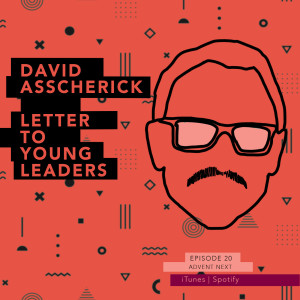
Wednesday Oct 02, 2019
David Asscherick: Letter to Young Leaders
Wednesday Oct 02, 2019
Wednesday Oct 02, 2019
Whether you’re entering into the path of ministry or starting a new profession, it’s easy to get discouraged when our grand hopes fail to meet the harsh realities of life. On this podcast episode of Advent Next we are continuing our discussion with David Asscherick as he gives young leaders advice on how to navigate the joys and heartaches of their ministry and/or profession.
“Whatever your hand finds to do, do it with all your might. Whether it’s an optimal situation or a compromised situation, life has it’s season and cycles.” No matter what life gives you, going forward in faith with the belief that God will honor our diligence is the hope we have in Christ. Personal excellence regardless of our station, prepares us for greater responsibility. This hope is the practical application of “whoever is faithful in little will be faithful in much.”
Some call it the “Mozart Effect.” It’s the unspoken pressure to create a masterpiece by the ripe old age of five. In the digital era of Instagram, Facebook, and young business bloomers, this lofty ideal can often lead us into creating unrealistic expectations for our life. “We don’t all just get to decide, ‘hey I’m 26 years old, I’m freshly out of school, and I just want my best life. I want to get paid great and live where I want to live.’ It doesn’t work like that. Sometimes you have to pay your dues.”
In addition, to having overly ambitious career expectations, in ministry, we can also have hyper idealistic ideological expectations. The pressure to reform the churches in which we find ourselves, may not always be what is needed. “Don’t go into churches that have a traditional format and a slightly older constituency and feel like you have to completely reform these situations. Go in there and be a servant, go in there and be a minister without a strong ideological agenda or methodological agenda.”
When we’re not measuring ourselves by the progress of our peers, we can often fall into the trap of using a faulty metric system for evaluating our own success.
“The metrics that we have organizationally are more or less baptism, attendance and tithe. The problem is those are nowhere near the only meaningful metrics of success… Too often we look at metrics that are post-harvest. They’re not those metrics that are leading people to make a decision.”
Yet there is a silver lining of hope knowing that growth is often the product of navigating difficult life circumstances. “The best versions of ourselves sometimes involve being in situations we would not have chosen.”
Finally, David Asscherick leaves us with the perspective that regardless of what we find ourselves doing in life, always let our relationship with Jesus be enough. “We need to get to the place where Jesus is enough. If you get more than that, if you get an incredible ministry situation in a great church, in a perfect location, then praise God. But if you find yourself in a less than optimal situation and life is hard…if you got Jesus, then you’ve got enough.”
You can also listen on:
Facebook: www.Facebook.com/adventnext
Instagram: www.instagram.com/adventnext
Youtube: https://www.youtube.com/channel/UCF6IbZ5pEYtgoWf88hb7vHQ
Spotify: https://open.spotify.com/show/7cdgW0RKIrny6Ru47l61CE
Apple Podcast: https://podcasts.apple.com/us/podcast/advent-next/id1452748484
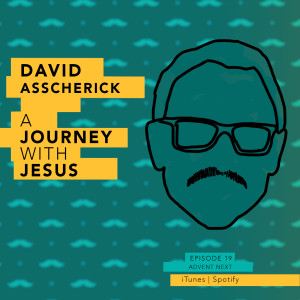
Wednesday Sep 25, 2019
David Asscherick: A Journey With Jesus
Wednesday Sep 25, 2019
Wednesday Sep 25, 2019
Every journey with Jesus is unique. But one thing is certain. Every sojourner’s travel contains both the transcendent moments of mountaintop clarity as well the valley’s “dark night of the soul.” So today, we have the privilege of getting to know someone who has experienced both. Joining us on this podcast episode of Advent Next is David Asscherick, a well-known speaker, preacher, pastor, author, avid rock climber, husband, and father.
In recounting how he has changed over the years as a minister, pastor, and disciple of Jesus, he narrates his journey from hyper idealism to spiritual maturation in Christ. “I was incredibly idealistic..when I came into Christianity I didn’t leave all of that idealism at the door. I just brought it with me. Sometimes we have this idea that when you’re baptized you leave all that baggage, you leave all that behind and now you’re this new creature in Christ-- that’s true. But that transition is incremental, its sequential, and we grow into who we are in Christ, our maturity in Christ.”
I often wonder how various leaders relate to their peers and how their peers relate to them. In my own idealism, I imagine that in the field of ministry, those who have given up a life in the private sector to serve the body of Christ, would all be divested of the spirit of competition. However, experience and even the Bible provides counterexamples to this pollyanna world view. So I asked David what his experience has been regarding professional jealousies. In response, he gave us an example of the kind of character we should strive to imitate.
“Barnabas is always networking in such a way that he’s creating opportunities for other people to succeed...Barnabas is someone who loves the success of others. There are people who have the gift of helping others to flourish, and Barnabas was that person. I want to be that person.”
“We need to get to the point where we are so surrendered to Jesus and so unmindful of self and of ambition that we are absolutely thrilled when God is growing His kingdom through other people’s expertise and through their giftedness. I want to be thrilled if my ARISE students or if my colleagues or my associates go running by me because we have a world to reach. And at the end of the day, who cares who gets the credit. We’re all going to take our crowns off, and we’re going to put them at the feet of Jesus, and we’re going to say, ‘Worthy is the Lamb.’”
While marinating in his counsel to assume a posture of humility, we ended our talk discussing how Jesus goes about the daily task of wooing of his heart. How does Jesus cause him to fall back in love with Him day after day? The answer lied in keeping with a spirit of thankfulness.
“In Romans chapter 1 Paul goes through this incredible catalog of the Gentile sins...and then right in the middle of this catalog of these really egregious sins, He says, ‘neither were they thankful.’ Paul was very happy to itemize unthankfulness with idolatry and sexual perversity. So for me I want to live an incredibly thankful life.”
There is so much more to this conversation that I wouldn’t want you to miss! So please check out our discussion with David Asscherick on iTunes or Spotify at our handle Advent Next. We know you’ll enjoy this insightful conversation on the inner life of faith and a journey with Jesus. Be sure to tune again next week on Advent Next as we continue our discussion with David Asscherick and hear his advice to young leaders and pastors. It’s a conversation you don’t want to miss!
Be sure to check out our previous podcast episodes here. Or tune on iTunes or Spotify @ Advent Next.
Facebook: www.Facebook.com/adventnext
Instagram: www.instagram.com/adventnext
Youtube: https://www.youtube.com/channel/UCF6IbZ5pEYtgoWf88hb7vHQ
Spotify: https://open.spotify.com/show/7cdgW0RKIrny6Ru47l61CE
Apple Podcast: https://podcasts.apple.com/us/podcast/advent-next/id1452748484
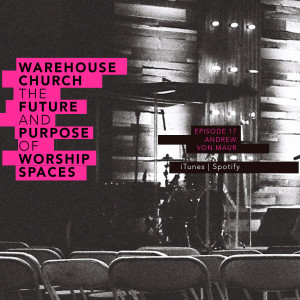
Wednesday Sep 18, 2019
Warehouse Church: The Future and Purpose of Worship Spaces (Andrew Von Maur)
Wednesday Sep 18, 2019
Wednesday Sep 18, 2019
If buildings could talk, what would they say? On this episode of Advent Next, we’re continuing our conversation with professor Andrew Von Maur, asking questions regarding modern religious trends. Warehouse churches have grown in popularity over the years, and on this podcast, we discuss how this style of worship came to be as well as what the future of worship design might hold.
“We have the capacity in the way we build our communities, in the way we build our buildings that have shared value, to communicate what we believe and to have those buildings reflect our values.”
As we look back on ancient civilizations, “Architecture is proof of the majesty and authority of an empire.” The pyramids of Giza or the Acropolis of Athens, “those buildings express something about the power of that civilization and their ideas.” From ancient days architecture has been used to speak the ideas and values of a community. As we invest less and less in communal spaces, a movement towards the mundane might cause us to miss out on the valuable opportunity to speak through the design of our worship spaces.
“Architecture is often on our money in that it somehow represents ideas. Like the Lincoln memorial, represents Lincoln and the Gettysburg address...Those colossal scaled columns say something about the authority that that idea has.”
Thinking intentionally about worship spaces means more than simply thinking of a person’s comfort and aesthetic surroundings. We must think in terms of mission. Thinking missionally means we must ask ourselves the question, “Are we trying to use the building to further our mission, or are we trying to use it to evoke certain memories?” Have we placed too much nostalgic emphasis on cultural icons that signal religious values like the authoritative religious signaling of Gothic architecture, or are we truly thinking of the best way to accomplish a defined mission?
Facebook: www.Facebook.com/adventnext
Instagram: www.instagram.com/adventnext
Youtube: https://www.youtube.com/channel/UCF6IbZ5pEYtgoWf88hb7vHQ
Spotify: https://open.spotify.com/show/7cdgW0RKIrny6Ru47l61CE
Apple Podcast: https://podcasts.apple.com/us/podcast/advent-next/id1452748484
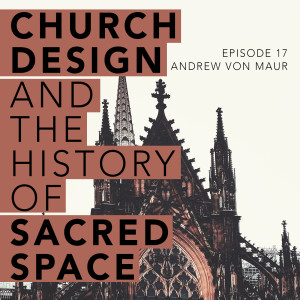
Sunday Aug 25, 2019
Church Design and the History of Sacred Space (Andrew Von Maur)
Sunday Aug 25, 2019
Sunday Aug 25, 2019
Church Architecture and the History of Sacred Space with Andrew Von Maur
As we peer into the history of architecture, studying the towering spires of medieval gothic churches or the modern warehouse churches of today, not only do we witness the magnificent ecclesiastical structures of Saint Peter’s Basilica in Rome or a grand stadium in Dallas, we behold the values of a generation. “Architecture [is] like frozen music,” as Andrew Von Maur quoting Johann Wolfgang von Goethe said. It captures the artistry and brilliance of the times and holds great significance for the communities in which these structures are built. Throughout history, the construction of megalithic monuments, like the pyramids of Giza or the Colosseum of Rome, were the pride and glory of the nations who built them.
In our modern American era, we tend to place less emphasis upon the beautification of public spaces and instead invest in our private abodes. We can observe this shift in values in our observation of certain spaces more than others.
So how does the shifting value changes of our culture, affect the special craftsmanship and beauty in our spaces of worship?
On today's podcast of Advent Next, we are talking with Andrew Von Maur, a professor of architecture at Andrews University to discuss the church architecture and the history of sacred space. “Architecture is not about architecture, it’s about bigger things, things that are more important than architecture. The tabernacle is not about the tabernacle, it’s about God’s way. And He describes that ‘way’ through many means to us, and that building is just one way.”
Today, we will learn how architecture can be not only a reflection of a communities values, but it's theology as well. Ever wonder why the design and build of protestant churches is different from the churches of medieval Europe? The answer lies in how a person or people group interpret scriptures. Discover the how the theology of the protestant reformation impacted the design and build of churches.
Facebook: www.Facebook.com/adventnext
Instagram: www.instagram.com/adventnext
Youtube: https://www.youtube.com/channel/UCF6IbZ5pEYtgoWf88hb7vHQ
Spotify: https://open.spotify.com/show/7cdgW0RKIrny6Ru47l61CE
Apple Podcast: https://podcasts.apple.com/us/podcast/advent-next/id1452748484
